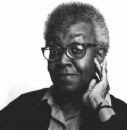I think of memorizing things as crunches for your brain. It exercises the muscles. So to keep you in top mental conditoin over the break, I would like you to memorize the General Prologue to the Canterbury Tales (click here for the audio version). The version here is read by Larry D. Benson of Harvard University. This is due the week of January 12-16. After break I will post a schedule for you to recite this to me individually.
1 Whan that Aprill with his shoures soote
When April with its sweet-smelling showers
2 The droghte of March hath perced to the roote,
Has pierced the drought of March to the root,
3 And bathed every veyne in swich licour
And bathed every vein (of the plants) in such liquid
4 Of which vertu engendred is the flour;
By the power of which the flower is created;
5 Whan Zephirus eek with his sweete breeth
When the West Wind also with its sweet breath,
6 Inspired hath in every holt and heeth
In every holt and heath, has breathed life into
7 The tendre croppes, and the yonge sonne
The tender crops, and the young sun
8 Hath in the Ram his half cours yronne,
Has run its half course in Aries,
9 And smale foweles maken melodye,
And small fowls make melody,
10 That slepen al the nyght with open ye
Those that sleep all the night with open eyes
11 (So priketh hem Nature in hir corages),
(So Nature incites them in their hearts),
12 Thanne longen folk to goon on pilgrimages,
Then folk long to go on pilgrimages,
13 And palmeres for to seken straunge strondes,
And professional pilgrims (long) to seek foreign shores,
14 To ferne halwes, kowthe in sondry londes;
To (go to) distant shrines, known in various lands;
15 And specially from every shires ende
And specially from every shire's end
16 Of Engelond to Caunterbury they wende,
Of England to Canterbury they travel,
17 The hooly blisful martir for to seke,
To seek the holy blessed martyr,
18 That hem hath holpen whan that they were seeke.
Who helped them when they were sick.
Friday, December 19, 2008
A Favorite

"A Christmas Memory", by Truman Capote, has long been my favorite Christmas story. Capote was one of the great American storytellers, and this semi-autobiographical story about a young boy and his aunt making fruitcakes for the holidays never fails to make me cry a little. I'm thinking about it this year as I embark on my own Christmas baking adventure. Written in the fifties, the story might seem somewhat dated in its language, but as a bittersweet story of friendship it is timeless. Enjoy.
Wednesday, December 10, 2008
Continuing the Conversation
Great conversation in class today.
In light of our discussion about the lake and the field, consider the following:
In "Notes", O'Brien says that by leaving Kiowa's death out of a previous version of "Speaking of Courage", he had "lost the natural counterpoint between the lake and the field. A metaphoric unity was broken."
What is the lake a metaphor for? What is the field a metaphor for? How are the lake and the field connected? What is this connection a metaphor for? What idea does this metaphor suggest?
Answer all parts of this question, but don't write a novel. Keep it clear. Mind your grammar, spelling, punctuation, etc.. and feel free to respond appropriately to other posts.
In light of our discussion about the lake and the field, consider the following:
In "Notes", O'Brien says that by leaving Kiowa's death out of a previous version of "Speaking of Courage", he had "lost the natural counterpoint between the lake and the field. A metaphoric unity was broken."
What is the lake a metaphor for? What is the field a metaphor for? How are the lake and the field connected? What is this connection a metaphor for? What idea does this metaphor suggest?
Answer all parts of this question, but don't write a novel. Keep it clear. Mind your grammar, spelling, punctuation, etc.. and feel free to respond appropriately to other posts.
Sunday, September 28, 2008
Friday, September 26, 2008
And finally, the Truth is...
 The other day in class, I asked you all to define "Truth".
The other day in class, I asked you all to define "Truth".What a ridiculous question.
As soon as you figure it out, let me know, and I'll book you a spot on The View. Until then, let's deal with a more manageable question:
Based on your reading of Cat's Cradle, how does Vonnegut lead us to view truth?
And here's the kicker. The first three people to post, only need to answer the question. All posters after that need to answer the question and specifically respond to another poster's thoughts.
Try not to respond only to your buddies; respond to comments that you have something to say about. This blog assignment WILL be graded. Be thoughtful; be smart. AND WARNING: I wouldn't even try this until you've finished the book!
Monday, September 15, 2008
On poets behaving badly...
Here are some jobs that Bukowski had in his life: dishwasher, truck driver and loader, mail carrier, guard, gas station attendant, stock boy, warehouse worker, shipping clerk, post office clerk, parking lot attendant, Red Cross orderly, and elevator operator. He also worked in a dog biscuit factory, a slaughterhouse, a cake and cookie factory, and he hung posters in New York City subways. He drank a lot, until he developed a bleeding ulcer. He was tortured. How do you think his poem "the trash men" connects with Kafka's story, "A Hunger Artist"?
Thursday, September 11, 2008
Hungry like a panther...
You probably don't get the Duran Duran reference, but anyway...
Good discussion today. I'm curious to see whether any of you will change your classifications after we finish dissecting "A Hunger Artist" tomorrow. To that end, please post a short (one sentence) answer to each of the following questions:
1. What might be admirable about fasting?
2. What might be admirable about a panther?
Thanks!
Good discussion today. I'm curious to see whether any of you will change your classifications after we finish dissecting "A Hunger Artist" tomorrow. To that end, please post a short (one sentence) answer to each of the following questions:
1. What might be admirable about fasting?
2. What might be admirable about a panther?
Thanks!
Subscribe to:
Posts (Atom)















